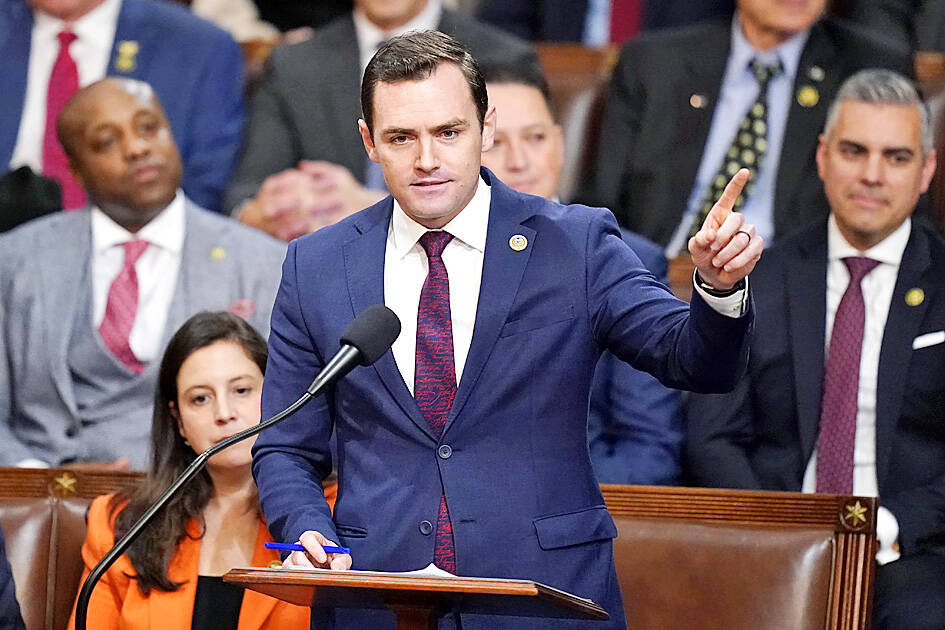Taiwan is concerned about delays in the delivery of weapons by Washington, US Representative Mike Gallagher told US media following a visit to Taiwan.
Ministry of Foreign Affairs spokesman Jeff Liu (劉永健) yesterday said Gallagher met with President Tsai Ing-wen (蔡英文), Vice President William Lai (賴清德) and National Security Council Secretary-General Wellington Koo (顧立雄) during his visit from Friday last week to Monday.
Gallagher chairs the US House of Representatives Select Committee on the Strategic Competition Between the United States and the Chinese Communist Party.

Photo: AP
Presidential Office spokeswoman Kolas Yotaka confirmed Tsai’s meeting with Gallagher, adding that Taiwan welcomes visits by international friends, and hopes to work with them to safeguard democracy, freedom and peace.
In an interview with the Washington Post published on Wednesday, Gallagher said every Taiwanese official he met said Russia’s invasion of Ukraine made Taiwan realize the need to acquire and stockpile advanced weapons.
Taiwanese leaders are concerned about delays in arms deliveries from the US, he said.
“I think that’s unacceptable,” Gallagher said.
Taiwan faces a US$19 billion arms backlog, including crucial weapons such as Harpoon anti-ship missiles and F-16 jets, the Post reported, quoting one congressional aide as saying that Harpoons “aren’t likely to begin arriving in real numbers until 2027 at the earliest.”
Gallagher said he hopes the committee can help push the US to “arm Taiwan to the teeth,” as it is “our best chance of preventing an invasion of Taiwan, and of essentially preventing World War III.”
Taiwan is “doing everything we could ask of them” to boost its own defense, such as increasing defense spending to 2.4 percent of its GDP, he said.
Gallagher reiterated similar views in an opinion piece he wrote for the Wall Street Journal on Tuesday, saying the US “must do a better job of countering the [Chinese] Communist Party’s malign influence operations in Taiwan,” including clearing the backlog of military sales.
“Repression is spreading outward all around the periphery of China — Xinjiang, Tibet, Hong Kong. The darkness presses beyond China’s borders, slithering into multinational institutions, over the Internet, throughout the global financial system. Against the darkness stands a candle that burns freely, fiercely, improbably in opposition: Taiwan,” he added.
Speaking about US House of Representatives Speaker Kevin McCarthy’s plan to visit Taipei, Gallagher said he was not aware of any active plans for the trip, but added: “If he wants to go, he certainly can.”
Gallagher said he plans to hold a select committee hearing in Taiwan by summer and report the findings to McCarthy, who can then make his plans with better information.
Gallagher and US House Minority Leader Hakeem Jeffries might visit Taiwan after the presidential election early next year, he added.
The foreign ministry has not received information about a possible hearing or McCarthy’s visit to Taiwan, but welcomes visits by US lawmakers, Liu said, adding that the Taipei Economic and Cultural Representative Office in the US would keep in close contact with the US Congress about related plans.

Right-wing political scientist Laura Fernandez on Sunday won Costa Rica’s presidential election by a landslide, after promising to crack down on rising violence linked to the cocaine trade. Fernandez’s nearest rival, economist Alvaro Ramos, conceded defeat as results showed the ruling party far exceeding the threshold of 40 percent needed to avoid a runoff. With 94 percent of polling stations counted, the political heir of outgoing Costa Rican President Rodrigo Chaves had captured 48.3 percent of the vote compared with Ramos’ 33.4 percent, the Supreme Electoral Tribunal said. As soon as the first results were announced, members of Fernandez’s Sovereign People’s Party

EMERGING FIELDS: The Chinese president said that the two countries would explore cooperation in green technology, the digital economy and artificial intelligence Chinese President Xi Jinping (習近平) yesterday called for an “equal and orderly multipolar world” in the face of “unilateral bullying,” in an apparent jab at the US. Xi was speaking during talks in Beijing with Uruguayan President Yamandu Orsi, the first South American leader to visit China since US special forces captured then-Venezuelan president Nicolas Maduro last month — an operation that Beijing condemned as a violation of sovereignty. Orsi follows a slew of leaders to have visited China seeking to boost ties with the world’s second-largest economy to hedge against US President Donald Trump’s increasingly unpredictable administration. “The international situation is fraught

MORE RESPONSIBILITY: Draftees would be expected to fight alongside professional soldiers, likely requiring the transformation of some training brigades into combat units The armed forces are to start incorporating new conscripts into combined arms brigades this year to enhance combat readiness, the Executive Yuan’s latest policy report said. The new policy would affect Taiwanese men entering the military for their compulsory service, which was extended to one year under reforms by then-president Tsai Ing-wen (蔡英文) in 2022. The conscripts would be trained to operate machine guns, uncrewed aerial vehicles, anti-tank guided missile launchers and Stinger air defense systems, the report said, adding that the basic training would be lengthened to eight weeks. After basic training, conscripts would be sorted into infantry battalions that would take

GROWING AMBITIONS: The scale and tempo of the operations show that the Strait has become the core theater for China to expand its security interests, the report said Chinese military aircraft incursions around Taiwan have surged nearly 15-fold over the past five years, according to a report released yesterday by the Democratic Progressive Party’s (DPP) Department of China Affairs. Sorties in the Taiwan Strait were previously irregular, totaling 380 in 2020, but have since evolved into routine operations, the report showed. “This demonstrates that the Taiwan Strait has become both the starting point and testing ground for Beijing’s expansionist ambitions,” it said. Driven by military expansionism, China is systematically pursuing actions aimed at altering the regional “status quo,” the department said, adding that Taiwan represents the most critical link in China’s